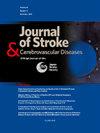High plasma thrombomodulin level is associated with a decreased risk of cognitive impairment after ischemic stroke
IF 2
4区 医学
Q3 NEUROSCIENCES
Journal of Stroke & Cerebrovascular Diseases
Pub Date : 2025-01-01
DOI:10.1016/j.jstrokecerebrovasdis.2024.108172
引用次数: 0
Abstract
Background
Thrombomodulin, a thrombin receptor with anticoagulant, anti-inflammatory, and cytoprotective properties, has been suggested to play a pivotal role in ischemic stroke. However, the association of plasma thrombomodulin with post-stroke cognitive impairment (PSCI) remains unclear. We aimed to prospectively investigate the associations of plasma thrombomodulin with PSCI among ischemic stroke patients in a multicenter cohort study.
Methods
We measured plasma thrombomodulin levels at baseline among 615 ischemic stroke patients from a preplanned ancillary study of the CATIS (China Antihypertensive Trial in Acute Ischemic Stroke). We used Montreal Cognitive Assessment (MoCA) to evaluate cognitive function at 3-month follow-up after ischemic stroke, and PSCI was defined as MoCA score <23.
Results
Plasma thrombomodulin was inversely associated with PSCI, and the adjusted odds ratio of PSCI for the highest versus lowest quartile of thrombomodulin was 0.50 (95 % CI: 0.28-0.92, Ptrend=0.026). Each standard deviation increment of log-transformed thrombomodulin was associated with a 23 % (odds ratio: 0.77, 95 % CI: 0.62-0.97, P=0.029) decreased risk of PSCI. In addition, plasma thrombomodulin could significantly improve the risk reclassification of PSCI beyond established risk factors (net reclassification index: 25.04 %, 95 % CI: 7.20 %-42.87 %, P=0.007; integrated discrimination improvement: 1.13 %, 95 % CI: 0.18 %-2.09 %, P=0.020).
Conclusions
High plasma thrombomodulin levels were associated with a decreased risk of PSCI among ischemic stroke patients. Our findings suggest that plasma thrombomodulin might be a predictive biomarker and potential therapeutic target for PSCI.
高血浆血栓调节蛋白水平与缺血性卒中后认知功能障碍风险降低相关。
背景:血栓调节素是一种凝血酶受体,具有抗凝、抗炎和细胞保护作用,已被认为在缺血性卒中中起关键作用。然而,血浆血栓调节蛋白与脑卒中后认知障碍(PSCI)的关系尚不清楚。我们的目的是在一项多中心队列研究中前瞻性地研究血浆血栓调节蛋白与缺血性脑卒中患者PSCI的关系。方法:我们测量了来自CATIS(中国急性缺血性卒中降压试验)预先计划的辅助研究的615例缺血性卒中患者的血浆血栓调节素基线水平。我们采用蒙特利尔认知评估(MoCA)评估缺血性卒中后3个月的认知功能,并将PSCI定义为MoCA评分。结果:血浆血栓调节蛋白与PSCI呈负相关,血栓调节蛋白最高四分位数与最低四分位数的PSCI校正比值比为0.50 (95% CI: 0.28-0.92, Ptrend=0.026)。对数转化血栓调节素每增加一个标准差,PSCI风险降低23%(优势比:0.77,95% CI: 0.62-0.97, P=0.029)。此外,血浆血栓调节素可显著提高PSCI在既定危险因素之外的风险重分类(净重分类指数:25.04%,95% CI: 7.20% ~ 42.87%, P=0.007;综合鉴别改善:1.13%,95% CI: 0.18% ~ 2.09%, P=0.020)。结论:高血浆血栓调节蛋白水平与缺血性脑卒中患者PSCI风险降低相关。我们的研究结果表明血浆血栓调节蛋白可能是PSCI的预测性生物标志物和潜在的治疗靶点。
本文章由计算机程序翻译,如有差异,请以英文原文为准。
求助全文
约1分钟内获得全文
求助全文
来源期刊

Journal of Stroke & Cerebrovascular Diseases
Medicine-Surgery
CiteScore
5.00
自引率
4.00%
发文量
583
审稿时长
62 days
期刊介绍:
The Journal of Stroke & Cerebrovascular Diseases publishes original papers on basic and clinical science related to the fields of stroke and cerebrovascular diseases. The Journal also features review articles, controversies, methods and technical notes, selected case reports and other original articles of special nature. Its editorial mission is to focus on prevention and repair of cerebrovascular disease. Clinical papers emphasize medical and surgical aspects of stroke, clinical trials and design, epidemiology, stroke care delivery systems and outcomes, imaging sciences and rehabilitation of stroke. The Journal will be of special interest to specialists involved in caring for patients with cerebrovascular disease, including neurologists, neurosurgeons and cardiologists.
 求助内容:
求助内容: 应助结果提醒方式:
应助结果提醒方式:


